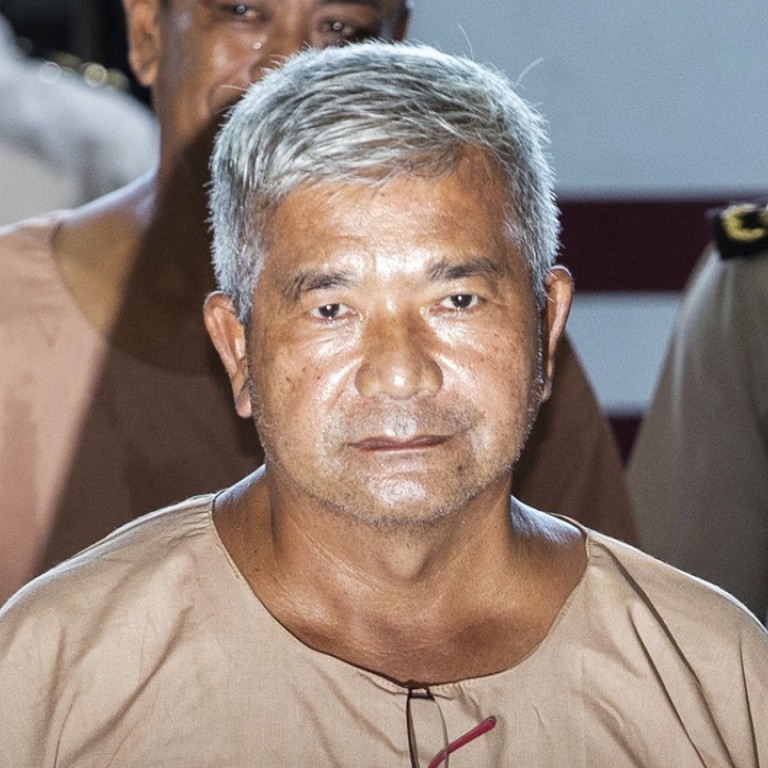
Thai general is jailed for 27 years in human-trafficking case, as rights groups press for justice
Lieutenant General Manus Kongpan was identified by the South China Morning Post in 2009 as orchestrating the brutal secret detention and expulsion of Rohingya migrants
A Bangkok court convicted the 62, including a general, police officers and provincial officials, on Wednesday at the end of Thailand’s biggest ever human-trafficking trial.
Lieutenant General Manus Kongpan was convicted of several offences involving trafficking and taking bribes and was sentenced to 27 years in prison. He had held a position with responsibility for keeping out and expelling migrants who entered Thailand illegally.
The longest jail term was 94 years, for Soe Naing, widely known as Anwar, a Rohingya man who police said was a key figure behind the jungle camp where dozens died.
At least one other defendant considered a kingpin in the illegal trade, Pajjuban Aungkachotephan, was also found guilty. He was a prominent businessman and former politician in the southern province of Satun. He received 75 years in prison.
Manus, also known as Manat Kongpan, was exposed by the South China Morning Post eight years ago for orchestrating the brutal secret detention and expulsion of Rohingya migrants. Other defendants include police officers, local politicians and Myanmar nationals.
In January 2009, the Post published a front-page story and photographs revealing Manus, then an army colonel with the Internal Security Operations Command (ISOC), had overseen the secret detention of Rohingya migrants on a remote Thai island.
The photos confirmed the involvement of Manus. They showed him barefoot in the sand, flanked by uniformed officers and other officials. He had previously denied the army was detaining the Rohingya and refused to discuss the matter.
However, the Post revealed the Thai army had been systematically towing Rohingya migrants out to sea on unpowered boats and then simply casting them adrift. Hundreds died as a result.
A video obtained by the Post showed the Rohingya crouching in the sand, visibly terrified as soldiers in fatigues and officials in civilian clothing interview and film them.

Manus denied mistreating the migrants, and told the Post in an interview that he had instead tried to help them, by paying for their food and water “from my own pocket”.
The trial began in 2015 after the discovery of more than 30 bodies in shallow graves near the Malaysian border in what authorities said was a jungle camp where traffickers held migrants hostage until relatives paid ransom for their release. The discovery led to more than 100 arrests.
Many of the dead were believed to be Rohingya, a persecuted Muslim minority from Myanmar, many of whom seek refuge in mostly Muslim Malaysia. Thailand has not released a full report on the graves or the results of forensic tests.
“The trial and convictions was just the first step,” said Sunai Phasuk, senior Thailand researcher at Human Rights Watch. “The government needs to do more beyond this and continue investigations. It should leave no stone unturned.”
The court took more than 12 hours to deliver the verdicts which rights groups said showed the government was serious about the problem. The convicted included Myanmar nationals.
While welcoming the outcome of the trial, rights groups said more needed to be done, both to protect the estimated 5,000 Rohingya in Thailand, and to investigate the smugglers’ camps where many more victims of beatings, disease and starvation are believed to be buried.
Police, troops and security volunteers in 2015 did not search hills surrounding the mass grave site, despite evidence from rights groups and media that other graves were dotted along the border.
Thai authorities shouldn’t sweep undiscovered mass graves under the rug of this trial
“Thai authorities shouldn’t sweep undiscovered mass graves under the rug of this trial,” Amy Smith, executive director of Fortify Rights, said in a statement. “We documented a massive operation that trafficked tens of thousands of Rohingya during a three-year period. The loss of life was significantly more than the focus of this trial.”
Weerachon Sukondhapatipak, a government spokesman, said Thailand would press on with investigations.
“The government will use the tools at its disposal to solve the trafficking problem,” Weerachon told Reuters. “We won’t stop at this.”
Myanmar’s treatment of its roughly 1 million Rohingya has emerged as its most contentious rights issue as it makes a transition from decades of harsh military rule.
The Rohingya are denied citizenship and classified as illegal immigrants from Bangladesh, despite claiming roots in the region that go back centuries, with communities marginalised and occasionally subjected to communal violence.
Many take smugglers’ boast across the Bay of Bengal, hoping to start new lives in Southeast Asia.


